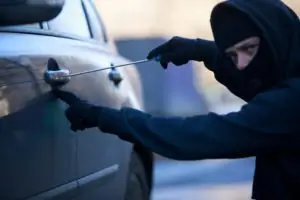
Dealing in stolen property is an extremely serious criminal charge that can result in years in prison and thousands of dollars in fines for those convicted of the crime in the State of Florida. In Bradenton, many people are tried every year for dealing in stolen property even if they had no knowledge the property in question was stolen.
A second-degree felony like this is very hard to fight, but you do have legal recourse available. There are several ways to defend against the prosecution’s case against you.
If you have been charged with dealing in stolen property, call The Law Place as soon as possible. Our team has over 75 years of combined experience representing clients just like yourself who are afraid of the consequences of a felony conviction. Your freedom, criminal record, and financial livelihood are all on the line.
We offer a free, no-obligation consultation with a qualified attorney from our firm. Take comfort in an excellent attorney-client relationship built on trust by enlisting The Law Place to defend your case.
Call The Law Place now at (941) 444-4444.
What Is Dealing in Stolen Property in Florida?
The crime of dealing in stolen property is a second-degree felony. According to Florida Statute 812.019, this can be defined as the trafficking, or endeavoring to traffic in, property that they know or should know is stolen. For example, selling a necklace that you know someone stole would fall under the category of dealing in stolen property.
The same statute defines the facilitation of theft and the subsequent stealing of property as a felony in the first degree. This is a more serious crime that covers all aspects of a coordinated operation between various offenders.
A typically unknown fact of these types of cases is that it does not matter how much the property was worth. For example, that necklace may be worth $20 and may fetch the same sentence as a stolen necklace worth $20,000. According to Florida law, any dealing in stolen property, no matter the value of the property, is charged the same way.
If you purchased a stolen item but had no intention of selling it, you cannot face charges of dealing in stolen property. However, you may still face lesser charges, such as the third-degree felony of grand theft.
If you are arrested for dealing in stolen property, you need to contact a lawyer as soon as possible. Your explanation for how you came into possession of or in the position of selling the stolen property will dramatically affect the rest of your case. A qualified criminal defense attorney will help guide you through the booking process and court trial to make sure you don’t say anything that can be used against you.
Contact us today to find out how we can help you and what options you may have for your defense.

Definitions of Legal Terms Used in Florida Dealing in Stolen Property Charges
It is important to understand what certain terms mean when they are used in the charges against you. For dealing in stolen property, relevant terms can be defined as follows:
- Property – Anything of value, both tangible and intangible, physical or digital. This includes intellectual property that a company or individual may claim. Also, anything that is found on, affixed to, or grows on publicly or privately owned land. Included in this definition are any services, rights, claims, interests, or privileges associated with the property in question.
- Traffic – Selling or otherwise disposing of stolen property. Also, if you bought, received, possessed, controlled, or used the property to sell or otherwise dispose of it, then you can be charged with dealing in stolen property. These types of charges are mostly to do with pawning items for cash.
- Endeavor – Any overt action to traffic in stolen property. This does not include thoughts or spoken words, but any action that brings the suspect closer to the act of dealing in stolen property.
- Stolen – Anything that was wrongfully, illegally, or criminally taken.
 We’re here to serve you. Our phones are open 24 hours a day.
We’re here to serve you. Our phones are open 24 hours a day. What Are the Penalties for Dealing in Stolen Property in Bradenton, Florida?
As mentioned above, dealing in stolen property is a felony in the second degree. The penalties for these types of crimes are as per Florida Statutes 775.082, 775.083, and 775.084:
- Up to 15 years in prison.
- Up to 15 years of probation.
- Up to $10,000 in fines.
- Permanent criminal record.
If you are charged with facilitating the theft and sale of stolen items, you can be charged with a felony in the first degree. The penalties for this are:
- Up to 30 years in prison.
- Up to $15,000 in fines.
- Permanent criminal record.
 We’re Florida’s top litigation team with over 75 years of combined experience
We’re Florida’s top litigation team with over 75 years of combined experience What Is the Statute of Limitations for Dealing in Stolen Property Charges?
According to Florida Statute 812.035, the state has five years to commence charges against suspects of dealing in stolen property. This period starts running from the date the crime occurred, not from when evidence of the crime was collected or when you were arrested.
 From the initial call to updates on your case status, we are here to get you answers.
From the initial call to updates on your case status, we are here to get you answers. What are Possible Defenses for Dealing in Stolen Property in Florida?
A qualified Florida criminal defense lawyer will examine multiple avenues to potentially defend you from dealing in stolen property charges. These can include but are not limited to:
- You truly did not know that the property had been stolen.
- You were misled by another person and was selling the property on their behalf, unaware that the items had been stolen.
- The stolen property was not trafficked as per the meaning defined by the Florida Statutes.
- Your understanding was that you had the legal right to sell or dispose of the property.
- The property was not stolen.
- Your understanding was that the property was given to you or was legitimately abandoned by the legal owner.
- The state has a mistaken understanding of the identity of the owner of the property in question.
- The victim of stolen property has made false statements regarding their ownership of the property.
- There is not enough evidence to support the prosecution’s claim that the property was stolen or trafficked.
- You have evidence or a legitimate explanation that refutes the prosecution’s claim that the property was stolen or that you had knowledge of the property being stolen.
An attorney from The Law Place will thoroughly examine the facts of the case and explore ways in which to adequately defend you from the charges. Call our hotline to speak with one of our representatives and set up a free consultation with an attorney from our team.
What Should I Do If I’ve Been Arrested for or Suspected of Dealing in Stolen Property in Florida?
The first thing we advise you to do is instead something you shouldn’t do. Do not speak to the police. Give them your name and address, but otherwise, say absolutely nothing to the police or other relevant authorities without a lawyer present. Anything you say can and will be used against you, and police officers do not need to read your Miranda rights to you before you are arrested and held for questioning.
Next, you need to contact a qualified criminal defense attorney. Only an experienced lawyer can adequately defend you from these very serious charges. Although you have the right to a public defender if you cannot afford a private attorney, The Law Place recommends doing everything in your power to hire a private attorney. Public defenders are usually overworked and underpaid, with a lack of the necessary resources at their disposal.
Here at The Law Place, our team prides itself on knowing we provide the best defense possible for our clients throughout Florida. Contact us today to find out how we can defend you from a dealing in stolen property case.
Can a Dealing in Stolen Property Conviction Be Expunged?
Under Florida law, no felony conviction can be expunged from the criminal record of the person in question. This means that a dealing in stolen property conviction is a permanent addition to your criminal record if you are convicted.
However, a qualified attorney might be able to have an arrest record expunged. If your case was dismissed, your conviction was overturned due to newly discovered evidence, or you were found not guilty at trial, you can apply for expungement of the arrest record. This is a complex process, so The Law Place recommends enlisting the aid of an attorney to help you through the steps.
Also, if you were a minor at the time of the arrest or conviction, you may be able to have the conviction expunged as per Florida’s Seal and Expunge Process. However, there must be circumstances that convince a judge to allow the expungement.
Contact The Law Place Criminal Defense Attorneys Today!
Have you been charged with dealing in stolen property in Bradenton? Are you accused of facilitating the theft and sale of items that were stolen? Are you afraid of going to prison?
Contact The Law Place immediately to start preparing your defense. A qualified lawyer is available for a free consultation where they will go over the specific defense strategies we can employ on your behalf. An attorney from our firm represents a combined experience of over 75 years in Florida criminal defense law across multiple practice areas. All our lawyers work together on every case, ensuring the best possible approach to your court trial.
Don’t wait to contact us. Your freedom is on the line.
Call The Law Place now at (941) 444-4444.



